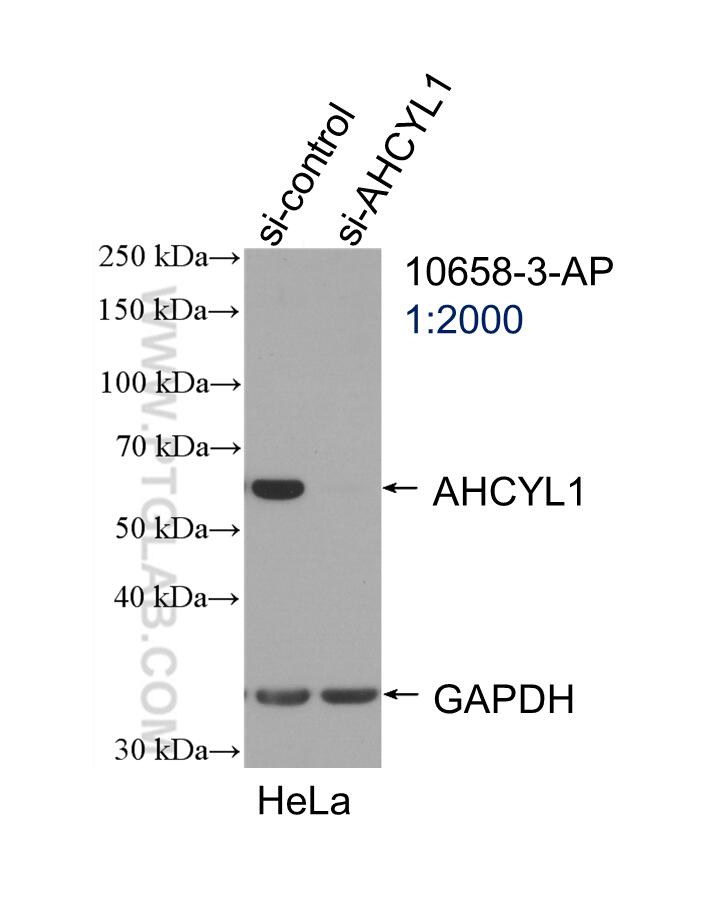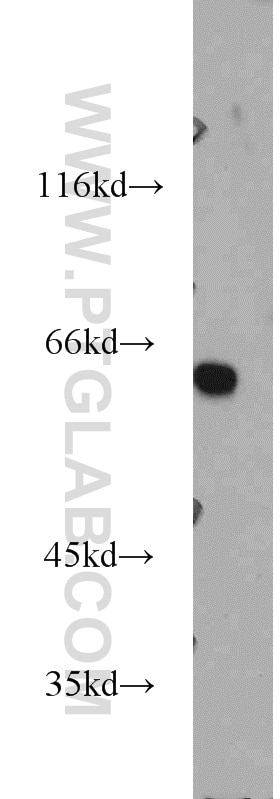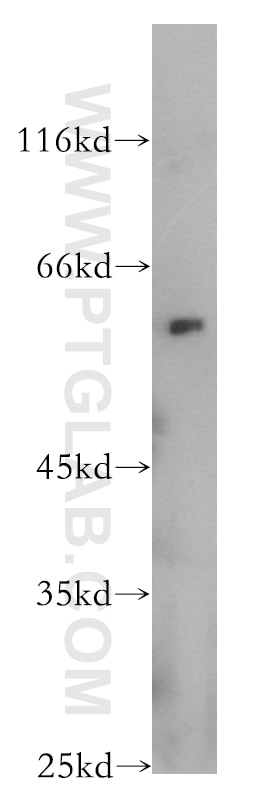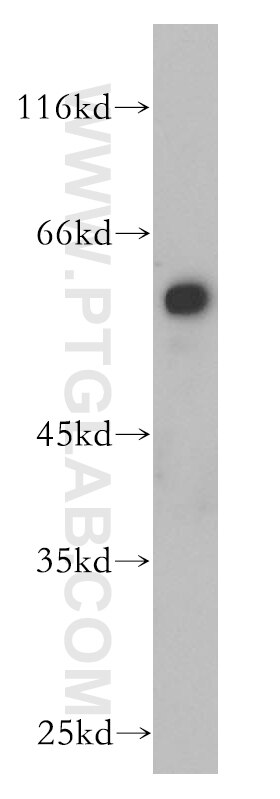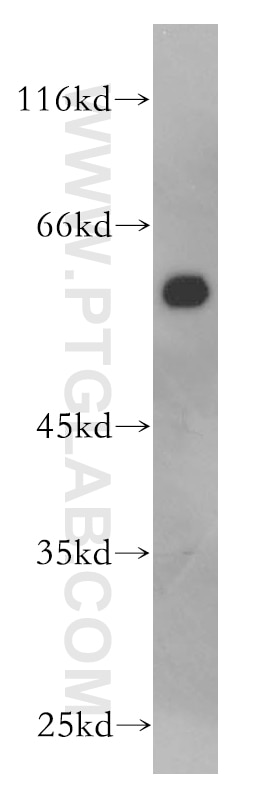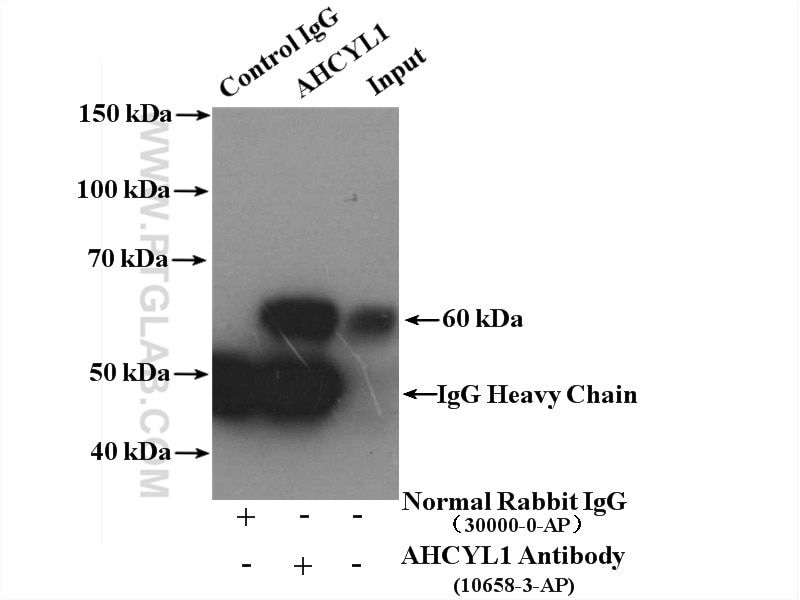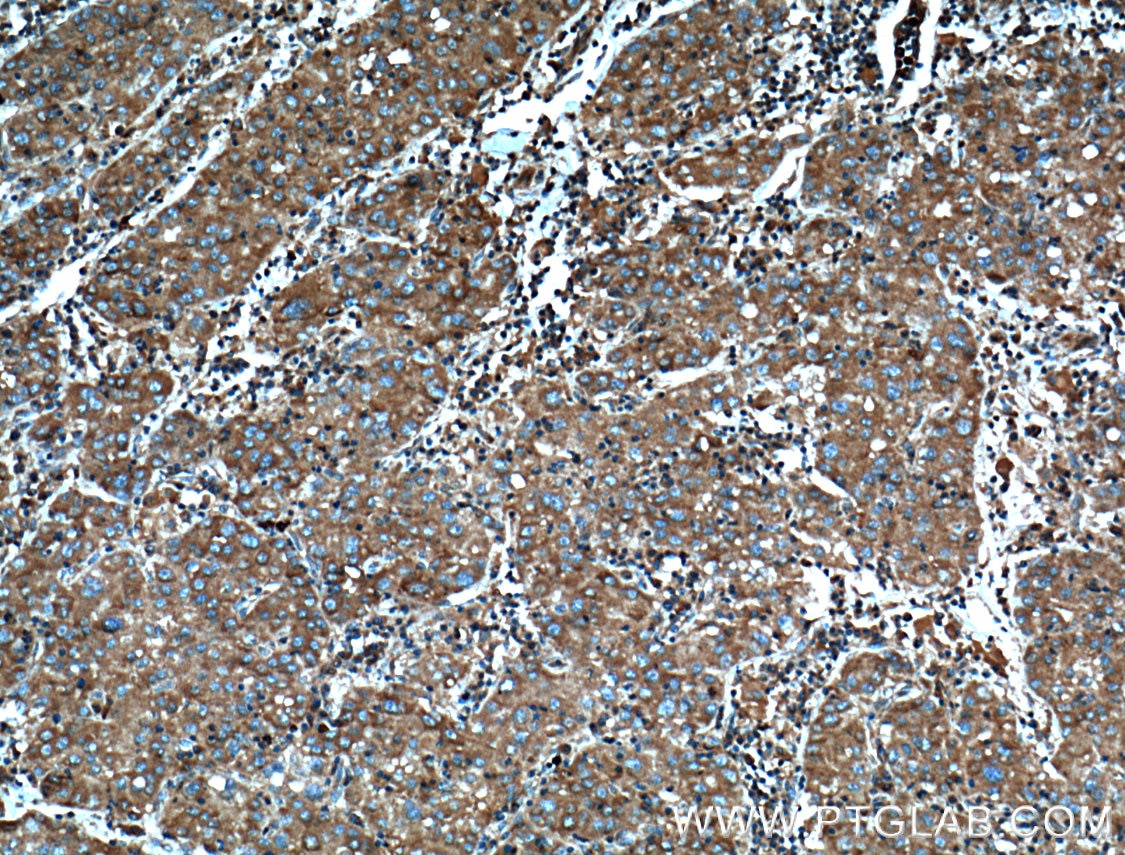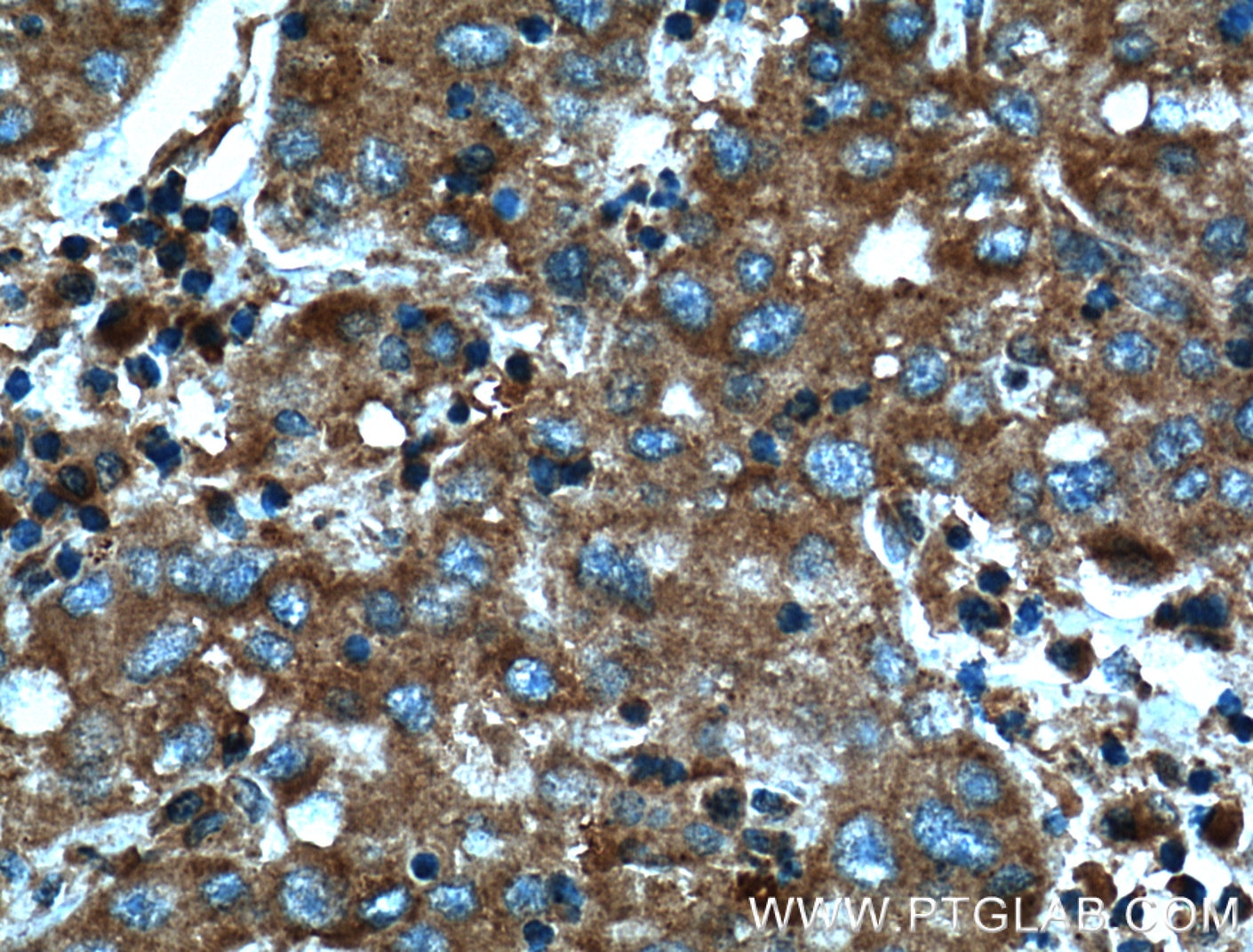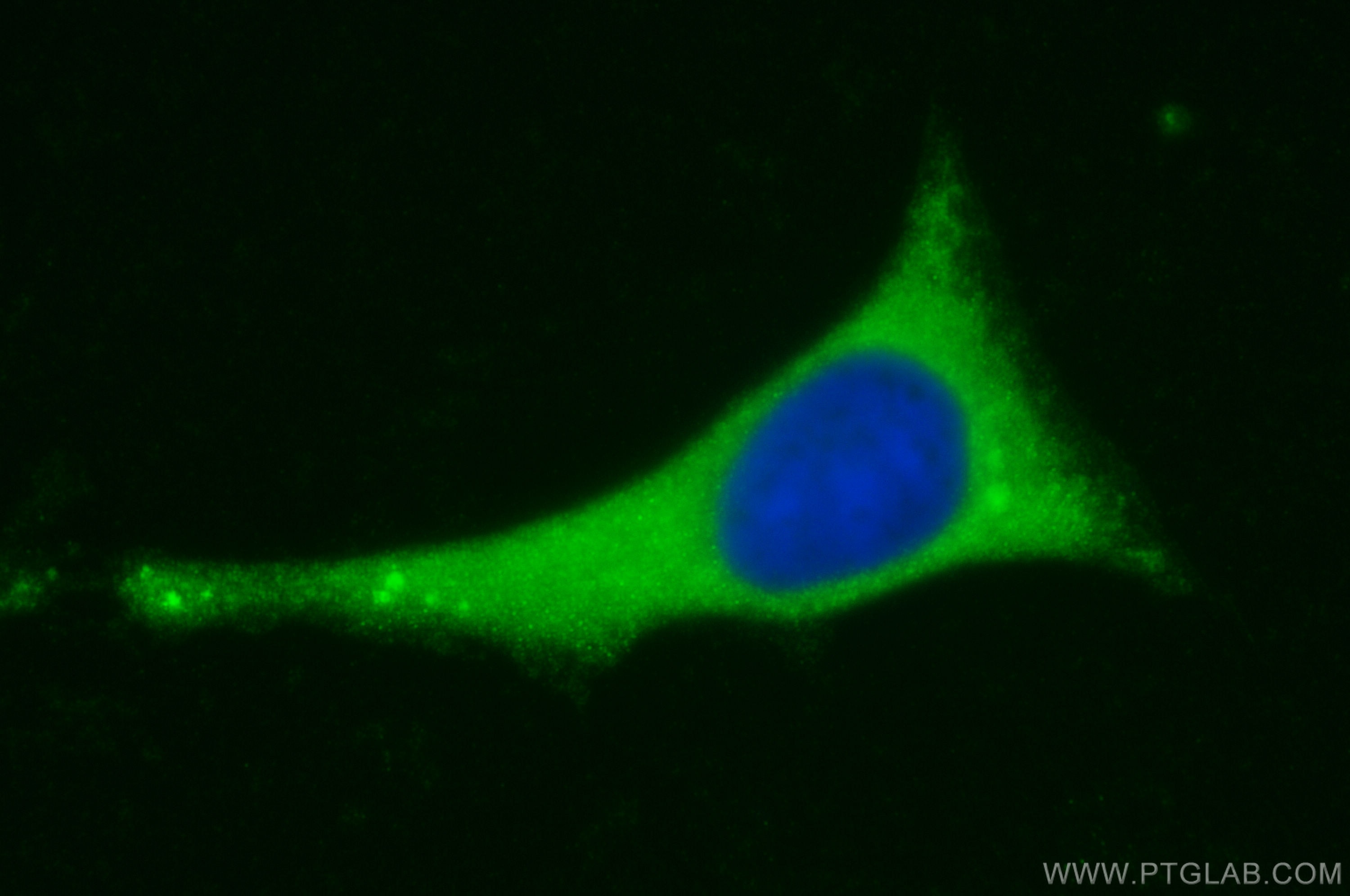- Phare
- Validé par KD/KO
Anticorps Polyclonal de lapin anti-AHCYL1
AHCYL1 Polyclonal Antibody for WB, IHC, IF/ICC, IP, ELISA
Hôte / Isotype
Lapin / IgG
Réactivité testée
Humain, rat, souris et plus (2)
Applications
WB, IHC, IF/ICC, IP, ELISA
Conjugaison
Non conjugué
N° de cat : 10658-3-AP
Synonymes
Galerie de données de validation
Applications testées
| Résultats positifs en WB | cellules Jurkat, cellules HeLa, tissu de thymus de souris |
| Résultats positifs en IP | cellules HeLa |
| Résultats positifs en IHC | tissu de cancer du foie humain il est suggéré de démasquer l'antigène avec un tampon de TE buffer pH 9.0; (*) À défaut, 'le démasquage de l'antigène peut être 'effectué avec un tampon citrate pH 6,0. |
| Résultats positifs en IF/ICC | cellules HeLa, |
Dilution recommandée
| Application | Dilution |
|---|---|
| Western Blot (WB) | WB : 1:500-1:2000 |
| Immunoprécipitation (IP) | IP : 0.5-4.0 ug for 1.0-3.0 mg of total protein lysate |
| Immunohistochimie (IHC) | IHC : 1:100-1:400 |
| Immunofluorescence (IF)/ICC | IF/ICC : 1:200-1:800 |
| It is recommended that this reagent should be titrated in each testing system to obtain optimal results. | |
| Sample-dependent, check data in validation data gallery | |
Applications publiées
| WB | See 19 publications below |
| IHC | See 1 publications below |
| IP | See 2 publications below |
Informations sur le produit
10658-3-AP cible AHCYL1 dans les applications de WB, IHC, IF/ICC, IP, ELISA et montre une réactivité avec des échantillons Humain, rat, souris
| Réactivité | Humain, rat, souris |
| Réactivité citée | rat, Humain, porc, poulet, souris |
| Hôte / Isotype | Lapin / IgG |
| Clonalité | Polyclonal |
| Type | Anticorps |
| Immunogène | AHCYL1 Protéine recombinante Ag1017 |
| Nom complet | S-adenosylhomocysteine hydrolase-like 1 |
| Masse moléculaire calculée | 65 kDa |
| Poids moléculaire observé | 60 kDa |
| Numéro d’acquisition GenBank | BC007576 |
| Symbole du gène | AHCYL1 |
| Identification du gène (NCBI) | 10768 |
| Conjugaison | Non conjugué |
| Forme | Liquide |
| Méthode de purification | Purification par affinité contre l'antigène |
| Tampon de stockage | PBS with 0.02% sodium azide and 50% glycerol |
| Conditions de stockage | Stocker à -20°C. Stable pendant un an après l'expédition. L'aliquotage n'est pas nécessaire pour le stockage à -20oC Les 20ul contiennent 0,1% de BSA. |
Informations générales
S-adenosylhomocysteine hydrolase-like protein 1 (AHCYL1), also known as IP3 receptor-binding protein released with IP3 (IRBIT), regulates IP3-induced Ca2+ release into the cytoplasm of cells(PMID:23145124). This protein is also named as DCAL, XPVKONA and belongs to the adenosylhomocysteinase family. AHCYL1 mRNA and protein are most abundant in the glandular epithelium of adenocarcinoma of cancerous, but not normal and AHCYL1 protein is predominantly in the nucleus(PMID:22826361). It has 2 isoforms produced by alternative splicing.
Protocole
| Product Specific Protocols | |
|---|---|
| WB protocol for AHCYL1 antibody 10658-3-AP | Download protocol |
| IHC protocol for AHCYL1 antibody 10658-3-AP | Download protocol |
| IF protocol for AHCYL1 antibody 10658-3-AP | Download protocol |
| IP protocol for AHCYL1 antibody 10658-3-AP | Download protocol |
| Standard Protocols | |
|---|---|
| Click here to view our Standard Protocols |
Publications
| Species | Application | Title |
|---|---|---|
J Agric Food Chem Maternal Betaine Supplementation during Gestation Enhances Expression of mtDNA-Encoded Genes through D-Loop DNA Hypomethylation in the Skeletal Muscle of Newborn Piglets. | ||
J Agric Food Chem Mitotically stable modification of DNA methylation in IGF2/H19 imprinting control region is associated with activated hepatic IGF2 expression in offspring rats from betaine-supplemented dams. | ||
Mol Nutr Food Res Transgenerational Inheritance of Betaine-Induced Epigenetic Alterations in Estrogen-Responsive IGF-2/IGFBP2 Genes in Rat Hippocampus. | ||
Mol Nutr Food Res Maternal betaine supplementation in rats induces intergenerational changes in hepatic IGF-1 expression and DNA methylation. | ||
Pharmaceutics Protective Role of IRBIT on Sodium Bicarbonate Cotransporter-n1 for Migratory Cancer Cells. | ||
J Nutr Corticosterone-Induced Lipogenesis Activation and Lipophagy Inhibition in Chicken Liver Are Alleviated by Maternal Betaine Supplementation. |
